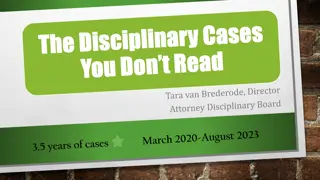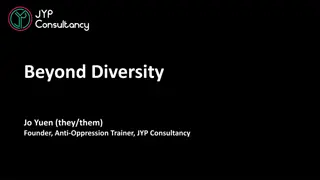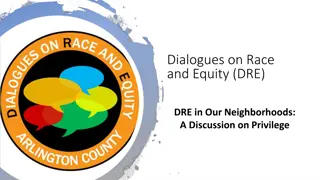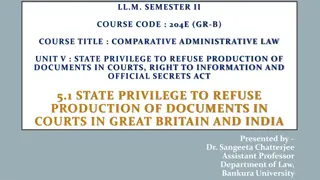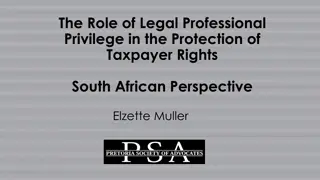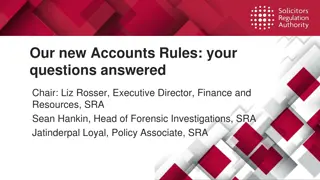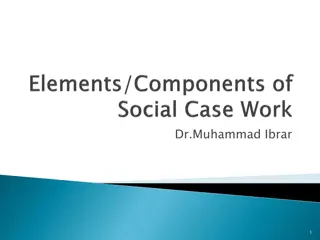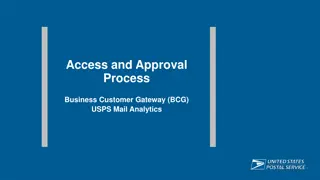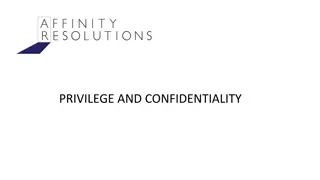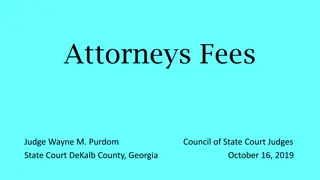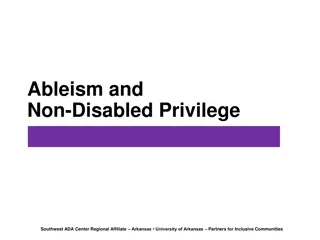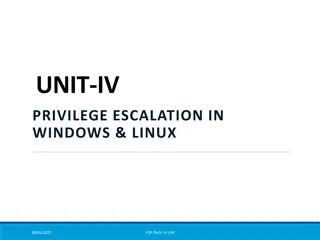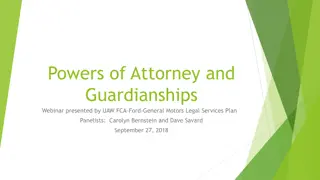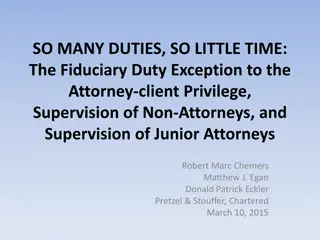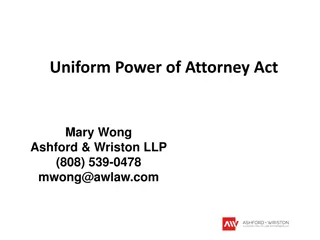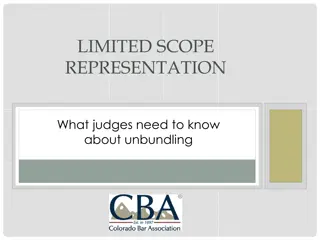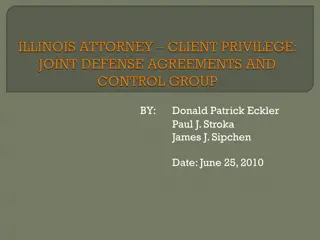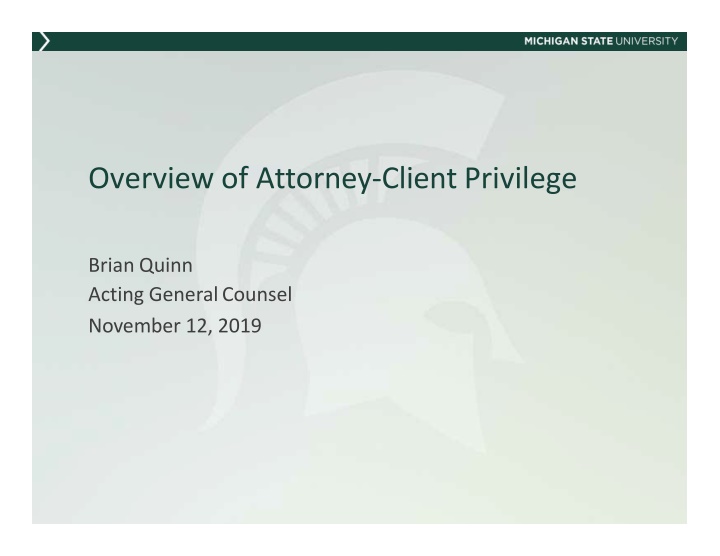
Attorney-Client Privilege: Key Concepts & Guidelines
Explore the fundamental aspects of attorney-client privilege, including its definition, scope, exceptions, and legal requirements. Learn about the significance of confidential communications for legal advice and the potential consequences of waiving the privilege. Delve into the crime-fraud exception and the necessity of privilege logs in legal proceedings.
Download Presentation

Please find below an Image/Link to download the presentation.
The content on the website is provided AS IS for your information and personal use only. It may not be sold, licensed, or shared on other websites without obtaining consent from the author. If you encounter any issues during the download, it is possible that the publisher has removed the file from their server.
You are allowed to download the files provided on this website for personal or commercial use, subject to the condition that they are used lawfully. All files are the property of their respective owners.
The content on the website is provided AS IS for your information and personal use only. It may not be sold, licensed, or shared on other websites without obtaining consent from the author.
E N D
Presentation Transcript
Overview of Attorney-Client Privilege Brian Quinn Acting GeneralCounsel November 12, 2019
Agenda What is the attorney-client privilege Who holds the privilege What are the consequences of waiving privilege
Attorney-Client PrivilegeDefined The attorney-client privilege attaches to direct communication between a client and his attorney as well as communications made through their respective agents. The scope of the attorney-client privilege is narrow, attaching only to [1] confidential communications [2] by the client to his advisor [3] that are made for the purpose of obtaining legal advice. Reed Dairy Farm v Consumers Power Co, 227 Mich App 614, 618; 576 NW2d 709 (1998)
For the Purpose of Obtaining Legal Advice Just because an attorney was involved in a communication does not mean that the privilege applies Example
Scope: Legal Advice vs. Facts Protects communications regarding legal advice Opinions, conclusions, and recommendations are protected by the attorney-client privilege when the facts are confidentially disclosed to an attorney for the purpose of legal advice. Leibel v GeneralMotors Corp, 250 Mich App 229, 239; 646 NW2d 179 (2002) Does not shield discovery of facts The privilege only protects disclosure of communications; it does not protect disclosure of the underlying facts by those who communicated with the attorney. Upjohn Co v United States, 449 US 383, 395 (1981)
The PrivilegeLog Date To From CC/BCC Subject Priv. Priv. Type Description Treatment Redact Attorney -Client 1/3/2017 Bob Jones Atty. Smith JaneTaylor Last Summer s Bike Accident Legaladvice re: motor vehicle litigation The law generally requires a party to create a privilege log if the party is withholding or redacting responsive information from a discovery production on the basis of privilege. See Fed R Civ P 26(b)(5)
The Crime-FraudException The crime-fraud exception to the attorney-client privilege is predicated on the recognition that where the attorney-client relationship advances the criminal enterprise or fraud, the reasons for supporting the privilege fail. Peoplev Paasche, 207 MichApp 698, 705; 525 NW2d 914 (1994) The evidence must show that the client was engaged in or was planning the criminal or fraudulent conduct when it sought the assistance of counsel and that the assistance was obtained in furtherance of the conduct or was closely related to it . . . . The exception does not apply if the assistance is sought only to disclose past wrongdoing, but it does apply if the assistance was used to cover up and perpetuate the crime or fraud. In re Grand Jury Subpoenas, 144 F3d 653, 660 (CA 10, 1998) (emphasis added)
Who Holds thePrivilege The attorney-client privilege is personal to the client, and only the client can waive it. Ravary v Reed, 163 Mich App 447, 453; 415 NW2d 240 (1987) Although either [the attorney or the client] can assert the privilege, only the client may waive the privilege. Kubiak v Hurr, 143 Mich App 465, 473; 372 NW2d 341 (1985)
Voluntary Disclosure = Waiver As a general rule, a client s voluntary disclosure of confidential communication to a third party waives and destroys the attorney-client privilege. In re Columbia, 293 F3d 289, 294 (CA 6, 2002) In the Sixth Circuit, which includes Michigan, once a client waives the privilege as to one party, the privilege is waived en toto. Id. This is true even when a client produces privileged documents to a regulator or government in cooperation with an investigation or pursuant to asubpoena. Id. at 292, 302
Selective Waiver is NotPermitted Cannot selectively waive attorney-client privilege as to one person (e.g., government regulators) and continue to assert privilege as to another person (e.g., a plaintiff in litigation) Id. at 292, 302-304 The client cannot be permitted to pick and choose among his opponents, waiving privilege for some and resurrecting the claim of confidentiality as to others, or to invoke the privilege as to communications whose confidentiality he has compromised for his own benefit. Id. at 304; see also Mainstay High Yield Corp Bond Fund v Heartland Indus Partners, 263 FRD 478, 481 (ED Mich, 2009)
Subject-MatterWaiver The widely applied standard for determining the scope of a waiver of attorney-client privilege is that the waiver applies to all other communications relating to the same subject matter. Mainstay, 263 FRD at 480 (internal quotation omitted). The guiding principle is that a claim of privilege should not be permitted to operate as a sword rather than a shield. Fed R Evid 502(a) Advisory Committee s Note (quoting In re Columbia, 293 F3d at 307) Privilege likely cannot be asserted to disclose some selected communications for self-serving purposes and may implicitly be waived when [a party] asserts a claim that in fairness requires examination of protected communications. United States v Bilzerian, 926 F2d 1285, 1292 (CA 2, 1991)
Attorney-Client Privilege ProtectionAct In response to 2006 McNulty Memo, the proposed Attorney Client Privilege Protection Act of 2007 (and 2009) was designed to preserve the privilege available to an organization The proposed Act did so by placing defined limits on a federal agency s power to coerce or pressure an organization to waive its legal protections or to act against the interests of its employees during the course of an investigation Organizations supporting the proposed Act were quite diverse (e.g., ABA, ACLU, US Chamber of Commerce) To prevent congressional intervention, DOJ revised its Manual
9-28.710 Attorney-Client and Work Product Protections The Department understands that the attorney-client privilege and attorney work product protection are essential and long-recognized components of the American legal system. What the government seeks and needs to advance its legitimate (indeed, essential) law enforcement mission is not waiver of those protections, but rather the facts known to the corporation about the putative criminal misconduct under review. In addition, while a corporation remains free to convey non-factual or "core" attorney-client communications or work product if and only if the corporation voluntarily chooses to do so prosecutors should not ask for such waivers and are directed not to do so. The critical factor is whether the corporation has provided the facts about the events, as explained further herein. (Emphasis added)
Consequences of WaivingPrivilege Classic privileged communications providing legal advice (like the following) could be disclosed: Potentialliability Strength and weaknesses of claims or defenses Subsequent or unintended legal risks Litigation and settlement strategies The potential scope of insurance coverage Future communications on the subject matter may lose privileged status


